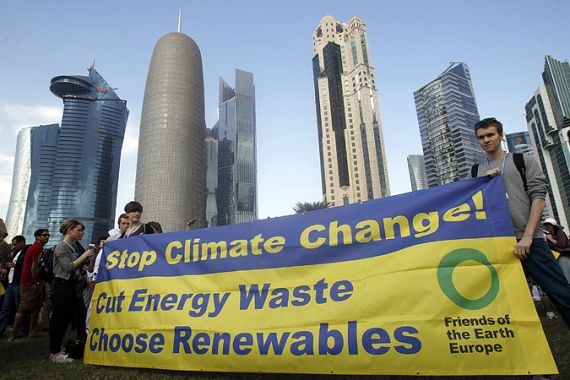Study: Global carbon emissions reach new high
Atmospheric carbon dioxide emissions rose by about three percent last year, according to a new study.

Atmospheric carbon dioxide (CO2) emissions rose by about three percent last year, according to a new study.
Last year, all the world’s nations combined pumped nearly 38.2 billion tonnes of carbon dioxide into the air from the burning of fossil fuels such as coal and oil, according to new international calculations on global emissions published on Sunday in the journal Nature Climate Change.
Keep reading
list of 4 itemsLost Futures
Photos: Greek valley that became a lake stirs drought debate
Botswana threatens to send 20,000 elephants to Germany
Scientists say it will be unlikely for the world to limit temperature increases to 2 degrees Celsius (3.6 degrees Fahrenheit).
Three years ago, nearly 200 nations set the 2-degree Celsius temperature goal in a non-binding agreement. Negotiators now at a conference under way in Doha, Qatar, are trying to find ways to reach that target.
Andrew Weaver, a climate scientist at the University of Victoria in Canada who was not part of the study, said: “We are losing control of our ability to get a handle on the global warming problem.”
Catastrophic impacts
Other research has warned of potentially catastrophic effects from a temperature rise of this kind.
Chronic droughts and floods would bite into farm yields, violent storms and sea-level rise would swamp coastal cities and deltas, and many species would be wiped out, unable to cope with habitat loss.
The overwhelming majority of the increase in emissions last year was from China, the world’s biggest carbon dioxide polluter.
Of the planet’s top 10 polluters, the US and Germany were the only countries that reduced their carbon dioxide emissions.
Developed countries have largely stabilised their emissions since 1990, the benchmark year used in the UN Framework Convention on Climate Change negotiations, the study said.
But this achievement has been eclipsed by emissions by China, India, Brazil and Indonesia and other developing economies, which are turning to cheap, plentiful coal to power their rise out of poverty.
In 1997, most of the world agreed to an international treaty, known as the Kyoto Protocol, that required developed countries such as the US to reduce greenhouse gas emissions by about five percent when compared with the baseline year of 1990.
But countries that are still developing, including China and India, were not limited by how much carbon dioxide they expelled. The US never ratified the treaty.
In 1990, developing countries accounted for 35 percent of worldwide output of CO2, the principal “greenhouse” gas blamed for warming Earth’s surface and inflicting damaging changes to the climate system. In 2011, this figure was 58 percent.